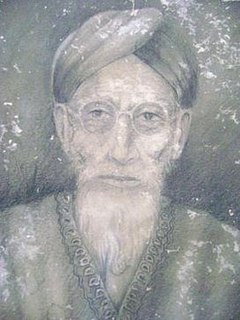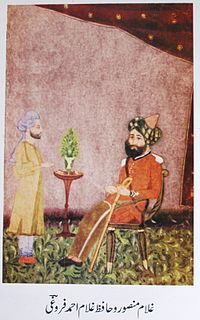
Hakim Syed Zillur Rahman is an Indian scholar of Unani medicine. He founded Ibn Sina Academy of Medieval Medicine and Sciences in 2000. He had earlier served as Professor and chairman, Department of Ilmul Advia at the Ajmal Khan Tibbiya College, Aligarh Muslim University, Aligarh, for over 40 years before retiring as Dean Faculty of Unani Medicine. Presently, he is serving AMU as "Honorary Treasurer". In 2006, the Government of India awarded him the Padma Shri for his contribution to Unani Medicine.
Tijara is a city and a municipality in Alwar district of the Indian state of Rajasthan. Tijara comes under the NCR area and is situated 48 km to the northeast of Alwar. The nearest railway station to Tijara is Khairthal. Bhiwadi is a census town in Tijara. It is the biggest industrial area of Rajasthan and part of the historical Ahirwal region. Tijara is dominated by Yadav and Meo community.

Ibn Sina Academy of Medieval Medicine and Sciences (IAMMS) is a trust registered under the Indian Trusts Act, 1882. Mohammad Hamid Ansari, former vice-chancellor of Aligarh Muslim University, Aligarh, formally inaugurated it on 21 April 2001. Department of AYUSH, Ministry of Health and Family Welfare, Government of India gave accreditation to the academy in 2004 and promoted it as 'centre of excellence' in 2008. Membership of the academy is open to anyone who has an interest in the academy's activities particularly on history of medicine and history of science. Being a charitable organization, donations to the Academy are also exempted from Income Tax under section 80G of the Income Tax Act 1961.

Hakim Syed Muhammad Karam Hussain was an Unani practitioner from Tijara, Alwar.
Qazi Syed Mohammad Rafi was a religious fundamentalist from Mewat (Haryana) in the British Raj. He was an influential personality in areas near Mewat and authored many books on religious issues.
Qazi Syed Mohammad Zaman was a judge edicted in accordance with the laws of sharia from Sakras, now in District Mewat, Haryana.
Qāḍī Sayyid Rāfiʿ Muḥammad Dasondhi was a scholar of repute from Sakras, District Gurgaon. He belonged to the family of Gardēzī Sadaat.
Qazi Syed Inayatullah was a scholar of Fiqh from Sakras, District Mewat (Haryana). He belonged to the family of Gardēzī Sadaat.
Qazi Syed Hayatullah was a Muslim scholar of Fiqh from Sakras, District Mewat. He belonged to the family of Gardēzī Sadaat.
Islam Khan V was one of the prominent Emir and nobleman during the Mughal empire. He was titled "Islam Khan" and "Barkhurdar Khan" by Emperor Bahadur Shah I and held many important posts during the successive rules of Bahadur Shah I, Jahandar Shah, Farrukhsiyar, Rafi ud Darajat, Shah Jahan II and Muhammad Shah.

Ghulam Mansoor was Subedar-Major in 1867 at Bhopal State.
Munshi Hakimuddin (1839–1894) was Chief Secretary at Bhopal state during the period of Nawab Shah Jahan Begum.

Hafiz Ghulam Ahmad Faroghi (1861–1919) was a scholar of repute of Arabic and Persian language at Bhopal state. He was first appointed as 'Head Maulvi' at Sulaimania School and then worked as a teacher at Jahangiria School. These two schools were very famous for affluent class during the princely state of Bhopal.
Tahawar Ali was a noble man in the court of Bhonsle Dynasty at Nagpur.
Syed Afzal Ali was a famous personality from Bulandshahr. Four of his sons were bestowed with the title of Khan Bahadur by British India, a rare distinction in a family of Indian history.
Qazi Hameeduddin (1873–1940) was a manager in the Department of Tanzimat at Bhopal state during the period of Nawab Sultan Jahan Begum.
Zakiruddin Zaki was an author, writer and social activist during the era of the Bhopal State.

Hakim Abdul Aziz was a prominent Unani physician in British India.

Tafazzul Hussain Khan was a key army personnel during the 1857 revolt. He was Risaldar of a mounted troop (Risala) during 1857 Indian revolt and was entitled, 'Captain' and 'Sardar Bahadur' by British India.
Syed Muhammad Saleem (1922–2000) was an Islamic scholar and activist of the All-India Muslim League at the time of independence of Pakistan in 1947.






